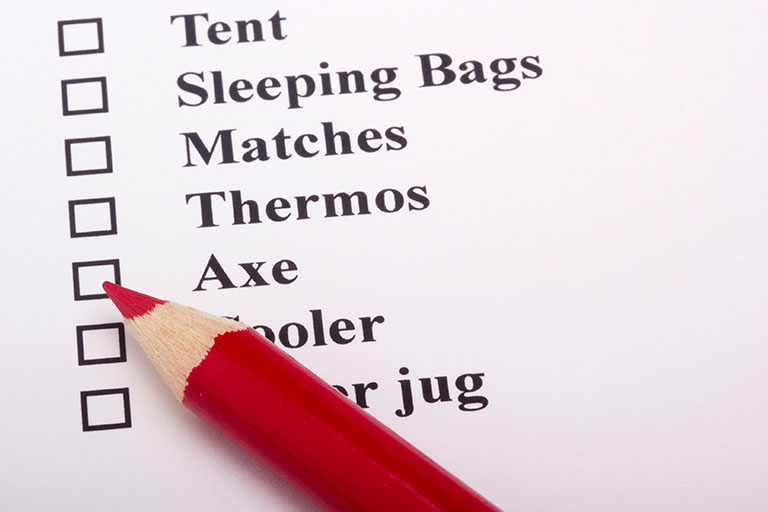By Debra Gibson Isaacs
Photos by Gerry James
“There is a saying in Baltimore that crabs may be prepared in 50 ways and that all of them are good.”
That quotation from journalist H.L. Mencken may be a bit tongue-in-cheek, but campers see its truth when applied to their favorite pastime. There are plenty of ways to prepare for your next camping adventure, and all of them are good.
The Centers for Disease Control and Prevention (CDC) has done a lot of the work for campers, and here are its suggestions. Visit cdc.gov for additional information on these topics.
Be prepared
Before you leave, check the weather report, learn about security at your camp location and tell family and friends your plans. Know what to do when toilets are not available. Be sure to bring along a supply trunk that includes a first-aid kit, compass or GPS, map, flashlight, blankets, batteries, food, water, clothes and medications. Know whom to contact at the camp to report any issues. When you return home, check for ticks, skin rashes or sunburn, dehydration and other problems.
Get vaccinated
Vaccinations can help protect against certain diseases and conditions while camping. Your doctor may recommend tetanus, pertussis (whooping cough), meningitis and/or hepatitis A, depending on your medical history, destination and other factors.
Prepare safe food and water
To keep your food and water safe:
• Pack foods in tight, waterproof bags or containers. Keep them in an insulated cooler.
• Wash hands and surfaces often. Use hand sanitizer if water is not available.
• Separate raw foods from cooked foods.
• Cook foods to proper temperatures. For instance, ground beef should be cooked to an internal temperature of at least 160 degrees.
• Chill foods promptly.
Include safe physical activities
Be sure to bring protective gear such as helmets, sturdy shoes and life jackets. Know your limits and take steps to avoid injury during activities. Never hike or swim alone. Watch kids closely. Adults should get at least 2.5 hours a week of physical activity and kids should get at least 1 hour a day.
Protect against carbon monoxide poisoning
Carbon monoxide is odorless and colorless and can cause illness or death in people and pets. Never use fuel-burning equipment such as gas stoves, heaters, lanterns and charcoal grills inside a tent, camper or other enclosed shelter. It can cause dangerous levels of carbon monoxide to build up.
As alternative heat sources to fuel-burning appliances inside an enclosed shelter, campers should bring adequate bedding and clothing and consume extra calories and fluids during the outing to prevent hypothermia (a dangerous loss of body warmth that can cause death).
Fight the bug bite
Mosquitoes, ticks and other insects can carry disease. To help fight the bite, apply insect repellent containing DEET to exposed skin. Be sure to follow directions. Check for ticks daily and remove them promptly. Wear long sleeves and pants that are light-colored to help prevent and spot ticks more easily.
Avoid temperature-related illness
To help prevent hypothermia during cool nights, bring adequate bedding and clothing to stay warm. Use a plastic ground cloth under your tent to help keep you dry. To help prevent heat-related illness during hot days, drink plenty of alcohol-free and sugar-free fluids. Don’t wait until you’re thirsty to drink. Wear layers of lightweight, light-colored and loose-fitting clothing. Rest often in shady areas.
Protect yourself from the sun
 Protection from ultraviolet radiation is important all year. UV rays from the sun can reach you on cloudy and hazy days as well as bright and sunny days. Use a broad-spectrum (against UVA and UVB rays) sunscreen and lipscreen rated at least SPF 15. Seek shade, especially during midday hours when the sun’s rays are strongest. Cover up with clothing, a wide-brimmed hat and sunglasses.
Protection from ultraviolet radiation is important all year. UV rays from the sun can reach you on cloudy and hazy days as well as bright and sunny days. Use a broad-spectrum (against UVA and UVB rays) sunscreen and lipscreen rated at least SPF 15. Seek shade, especially during midday hours when the sun’s rays are strongest. Cover up with clothing, a wide-brimmed hat and sunglasses.
Avoid water-related illness and injury
Camping often includes playing in and around the water. To help protect yourself and your fellow campers from illness, don’t swim if you have diarrhea, and don’t swallow the water you swim in. Take a shower before and after swimming. Never swim alone. If you plan to ride in a boat, canoe or other water vehicle, be sure to wear a life jacket.
Debra Gibson Isaacs has been a writer and photographer for more than 30 years. Based in Lexington, Kentucky, she is an avid adventurer with a passion for animals, particularly black bears, dogs and alligators.



